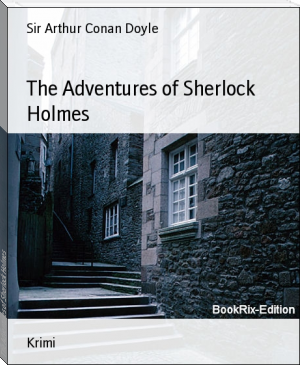The Adventures of Sherlock Holmes - Arthur Conan Doyle (ebook reader with highlight function TXT) 📗

- Author: Arthur Conan Doyle
- Performer: 0192835084
Book online «The Adventures of Sherlock Holmes - Arthur Conan Doyle (ebook reader with highlight function TXT) 📗». Author Arthur Conan Doyle
He had risen from his chair and was standing between the parted blinds gazing down into the dull neutral-tinted London street. Looking over his shoulder, I saw that on the pavement opposite there stood a large woman with a heavy fur boa round her neck, and a large curling red feather in a broad-brimmed hat which was tilted in a coquettish Duchess of Devonshire fashion over her ear. From under this great panoply she peeped up in a nervous, hesitating fashion at our windows, while her body oscillated backward and forward, and her fingers fidgeted with her glove buttons. Suddenly, with a plunge, as of the swimmer who leaves the bank, she hurried across the road, and we heard the sharp clang of the bell.
“I have seen those symptoms before,” said Holmes, throwing his cigarette into the fire. “Oscillation upon the pavement always means an affaire de coeur. She would like advice, but is not sure that the matter is not too delicate for communication. And yet even here we may discriminate. When a woman has been seriously wronged by a man she no longer oscillates, and the usual symptom is a broken bell wire. Here we may take it that there is a love matter, but that the maiden is not so much angry as perplexed, or grieved. But here she comes in person to resolve our doubts.”
As he spoke there was a tap at the door, and the boy in buttons entered to announce Miss Mary Sutherland, while the lady herself loomed behind his small black figure like a full-sailed merchant-man behind a tiny pilot boat. Sherlock Holmes welcomed her with the easy courtesy for which he was remarkable, and, having closed the door and bowed her into an armchair, he looked her over in the minute and yet abstracted fashion which was peculiar to him.
“Do you not find,” he said, “that with your short sight it is a little trying to do so much typewriting?”
“I did at first,” she answered, “but now I know where the letters are without looking.” Then, suddenly realising the full purport of his words, she gave a violent start and looked up, with fear and astonishment upon her broad, good-humoured face. “You’ve heard about me, Mr. Holmes,” she cried, “else how could you know all that?”
“Never mind,” said Holmes, laughing; “it is my business to know things. Perhaps I have trained myself to see what others overlook. If not, why should you come to consult me?”
“I came to you, sir, because I heard of you from Mrs. Etherege, whose husband you found so easy when the police and everyone had given him up for dead. Oh, Mr. Holmes, I wish you would do as much for me. I’m not rich, but still I have a hundred a year in my own right, besides the little that I make by the machine, and I would give it all to know what has become of Mr. Hosmer Angel.”
“Why did you come away to consult me in such a hurry?” asked Sherlock Holmes, with his finger-tips together and his eyes to the ceiling.
Again a startled look came over the somewhat vacuous face of Miss Mary Sutherland. “Yes, I did bang out of the house,” she said, “for it made me angry to see the easy way in which Mr. Windibank—that is, my father—took it all. He would not go to the police, and he would not go to you, and so at last, as he would do nothing and kept on saying that there was no harm done, it made me mad, and I just on with my things and came right away to you.”
“Your father,” said Holmes, “your stepfather, surely, since the name is different.”
“Yes, my stepfather. I call him father, though it sounds funny, too, for he is only five years and two months older than myself.”
“And your mother is alive?”
“Oh, yes, mother is alive and well. I wasn’t best pleased, Mr. Holmes, when she married again so soon after father’s death, and a man who was nearly fifteen years younger than herself. Father was a plumber in the Tottenham Court Road, and he left a tidy business behind him, which mother carried on with Mr. Hardy, the foreman; but when Mr. Windibank came he made her sell the business, for he was very superior, being a traveller in wines. They got £4700 for the goodwill and interest, which wasn’t near as much as father could have got if he had been alive.”
I had expected to see Sherlock Holmes impatient under this rambling and inconsequential narrative, but, on the contrary, he had listened with the greatest concentration of attention.
“Your own little income,” he asked, “does it come out of the business?”
“Oh, no, sir. It is quite separate and was left me by my uncle Ned in Auckland. It is in New Zealand stock, paying 4½ per cent. Two thousand five hundred pounds was the amount, but I can only touch the interest.”
“You interest me extremely,” said Holmes. “And since you draw so large a sum as a hundred a year, with what you earn into the bargain, you no doubt travel a little and indulge yourself in every way. I believe that a single lady can get on very nicely upon an income of about £60.”
“I could do with much less than that, Mr. Holmes, but you understand that as long as I live at home I don’t wish to be a burden to them, and so they have the use of the money just while I am staying with them. Of course, that is only just for the time. Mr. Windibank draws my interest every quarter and pays it over to mother, and I find that I can do pretty well with what I earn at typewriting. It brings me twopence a sheet, and I can often do from fifteen to twenty sheets in a day.”
“You have made your position very clear to me,” said Holmes. “This is my friend, Dr. Watson, before whom you can speak as freely as before myself. Kindly tell us now all about your connection with Mr. Hosmer Angel.”
A flush stole over Miss Sutherland’s face, and she picked nervously at the fringe of her jacket. “I met him first at the gasfitters’ ball,” she said. “They used to send father tickets when he was alive, and then afterwards they remembered us, and sent them to mother. Mr. Windibank did not wish us to go. He never did wish us to go anywhere. He would get quite mad if I wanted so much as to join a Sunday-school treat. But this time I was set on going, and I would go; for what right had he to prevent? He said the folk were not fit for us to know, when all father’s friends were to be there. And he said that I had nothing fit to wear, when I had my purple plush that I had never so much as taken out of the drawer. At last, when nothing else would do, he went off to France upon the business of the firm, but we went, mother and I, with Mr. Hardy, who used to be our foreman, and it was there I met Mr. Hosmer Angel.”
“I suppose,” said Holmes, “that when Mr. Windibank came back from France he was very annoyed at your having gone to the ball.”
“Oh, well, he was very good about it. He laughed, I remember, and shrugged his shoulders, and said there was no use denying anything to a woman, for she would have her way.”
“I see. Then at the gasfitters’ ball you met, as I understand, a gentleman called Mr. Hosmer Angel.”
“Yes, sir. I met him that night, and he called next day to ask if we had got home all safe, and after that we met him—that is to say, Mr. Holmes, I met him twice for walks, but after that father came back again, and Mr. Hosmer Angel could not come to the house any more.”
“No?”
“Well, you know father didn’t like anything of the sort. He wouldn’t have any visitors if he could help it, and he used to say that a woman should be happy in her own family circle. But then, as I used to say to mother, a woman wants her own circle to begin with, and I had not got mine yet.”
“But how about Mr. Hosmer Angel? Did he make no attempt to see you?”
“Well, father was going off to France again in a week, and Hosmer wrote and said that it would be safer and better not to see each other until he had gone. We could write in the meantime, and he used to write every day. I took the letters in in the morning, so there was no need for father to know.”
“Were you engaged to the gentleman at this time?”
“Oh, yes, Mr. Holmes. We were engaged after the first walk that we took. Hosmer—Mr. Angel—was a cashier in an office in Leadenhall Street—and—”
“What office?”
“That’s the worst of it, Mr. Holmes, I don’t know.”
“Where did he live, then?”
“He slept on the premises.”
“And you don’t know his address?”
“No—except that it was Leadenhall Street.”
“Where did you address your letters, then?”
“To the Leadenhall Street Post Office, to be left till called for. He said that if they were sent to the office he would be chaffed by all the other clerks about having letters from a lady, so I offered to typewrite them, like he did his, but he wouldn’t have that, for he said that when I wrote them they seemed to come from me, but when they were typewritten he always felt that the machine had come between us. That will just show you how fond he was of me, Mr. Holmes, and the little things that he would think of.”
“It was most suggestive,” said Holmes. “It has long been an axiom of mine that the little things are infinitely the most important. Can you remember any other little things about Mr. Hosmer Angel?”
“He was a very shy man, Mr. Holmes. He would rather walk with me in the evening than in the daylight, for he said that he hated to be conspicuous. Very retiring and gentlemanly he was. Even his voice was gentle. He’d had the quinsy and swollen glands when he was young, he told me, and it had left him with a weak throat, and a hesitating, whispering fashion of speech. He was always well dressed, very neat and plain, but his eyes were weak, just as mine are, and he wore tinted glasses against the glare.”
“Well, and what happened when Mr. Windibank, your stepfather, returned to France?”
“Mr. Hosmer Angel came to the house again and proposed that we should marry before father came back. He was in dreadful earnest and made me swear, with my hands on the Testament, that whatever happened I would always be true to him. Mother said he was quite right to make me swear, and that it was a sign of his passion. Mother was all in his favour from the first and was even fonder of him than I was. Then, when they talked of marrying within the week, I began to ask about father; but they both said never to





Comments (0)